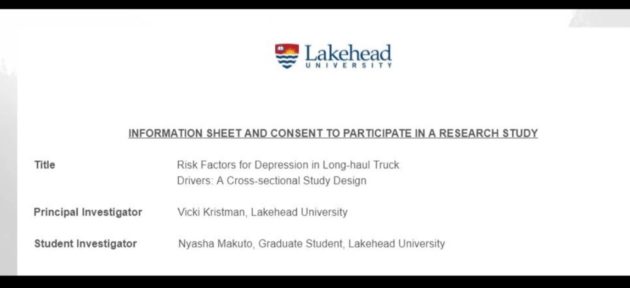Lakehead tries to figure out trucker depression
 THUNDER BAY, Ont. – Stress and poor mental health are already known to affect many longhaul truckers.
THUNDER BAY, Ont. – Stress and poor mental health are already known to affect many longhaul truckers.
Now, researchers at Lakehead University in Thunder Bay, Ont., are trying to pinpoint the causes.
“Risk factors for depression in truckers are currently poorly understood in the literature,” the university said.
“This study will allow for us to better understand factors that may influence the risk of depression in truckers.”
It added that the information the research generates can be used by all stakeholders in the industry to improve the working environment of longhaul truckers.
 The project is led by Prof. Vicki Kristman and graduate student Nyasha Makuto, who will use the data for her master’s thesis, Risk Factors for Depression in Longhaul Truck Drivers: A Cross-sectional Study Design.
The project is led by Prof. Vicki Kristman and graduate student Nyasha Makuto, who will use the data for her master’s thesis, Risk Factors for Depression in Longhaul Truck Drivers: A Cross-sectional Study Design.
They are working with the Owner-Operator’s Business Association of Canada (OBAC) to promote the study.
“We need to have real conversations about mental health. And we need better research that includes input from drivers themselves about what’s happening out on the road that impacts their health and well being,” said Joanne Ritchie, executive director of OBAC.
As a first step in determining the scope of the problem, the university is conducting an online survey on mental health issues.
“Ideally, I want to compare between American and Canadian and truckers,” said Makuto, adding that they face different working conditions.
Makuto told trucknews.com Tuesday that she would need 210 respondents to make such comparisons.
In the U.S., the Bureau of Labor Statistics said in a report released in 2018 that because of the potential for accidents, truck drivers have one of the highest rates of injuries and illnesses of all occupations.
That report followed a previous U.S. projection that more than a million American truckers will experience job-related trauma during their careers.
Recent campaigns by industry stakeholders have pushed the mental health of truckers to the front burner, with awareness workshops being held in various parts of North America.
Next month, Trucking HR Canada will host such a workshop in Toronto.
Have your say
This is a moderated forum. Comments will no longer be published unless they are accompanied by a first and last name and a verifiable email address. (Today's Trucking will not publish or share the email address.) Profane language and content deemed to be libelous, racist, or threatening in nature will not be published under any circumstances.
All this talk about stress and mental health. I truly believe that a lot of the reason is too many regulations. And that goes for most jobs these days, not just trucking. Think of the regulations a trucker deals with in a normal work day. Between the laws and rules that we need to adhere to at shipper/receivers we spend our whole day tip toeing through life trying to make sure we keep everyone happy, and do the things that are expected of us. Hours of service, pre trips, rules of the road, load security, safety and compliance, appointment times that need to be met, PPE requirements, and the list goes on. Think about that list and how complicated some of those regulations are. And how unrealistic some are as well. Is anyone really getting under their truck everyday to do a pre-trip, especially this time of year? Some of the regulations that we are required to abide by can’t even be figured out by the people that enforce them. We all have a breaking point. I think we are just finding out where that point is for the common working person.
Oh i think after 40yrs of Trucking I may have something to add!!
“Ideally, I want to compare between American and Canadian and truckers,” said Makuto, adding that they face different working conditions.“
This is not a trio affect,
The truck are American or Canadian
And not a third reference of truckers but BOTH are truckers with the same problems

It is a simple answer too many days in the cage (truck) and to long of time away from family, bills have to be paid kids have to be taken care off and often just the mother alone is stuck with the caring and for the top of all dispatch trying to force so you stay longer I did one time 22 days away and they wanted more.
So it become easy to get depress and look at the weather these days.It is a good reason to have hard time with the job.